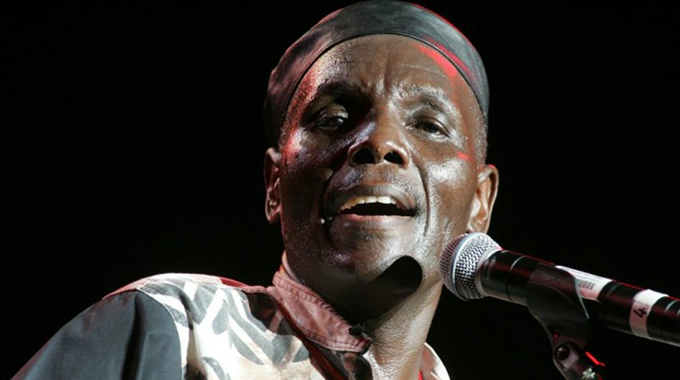Farewell humble giant

Joseph Katete
“My first musical composition was probably the cry I made when I was being born. I was born a musician,” the greatest Zimbabwe’s musical export Oliver Mtukudzi told me during one of his rare interviews with local journalists at the time.
It was in 2005 and I remember those days he was not comfortable around local journalists. Apparently he was not amused for what he believed was “invasion into his private space” by local journalists after not-so-flattering stories about his life had dominated headlines for some time.
Understandably this was the musical genius – Mtukudzi whose star status was almost reaching its crescendo since the turn of the millennium. This coincided with the time that he had teamed up with Debbie Metcalfe as his manager.
Metcalfe is credited for turning him into an international icon. Regional and international media was on each other’s feet to get their fair share of glory by having something about Mtukudzi in their news pieces.
The son from the humble Korekore clan in Zimbabwe’s Mashonaland Central Province was literally having the world under his feet due to the international publicity that he was enjoying.
It therefore did not make sense for him to have local journalists writing not-so-flattering articles about him. To cut the long story short – Tuku was just showing that he was human after all as he was ANGRY, DISAPPOINTED and probably FELT BETRAYED by local scribes. He reacted also by placing an embargo on local journalists because he did not know who to trust.
A window of opportunity however arose during one of my “dry days in terms of a diary item” to use the journalism parlance those days. For those not familiar with journalism, it is common practice that journalists congregate daily or weekly depending on whether the newspaper publication is a weekly or a daily one to present their story ideas.
Newspapers are printed everyday and journalists must have something to write everyday. The meeting during which the story ideas are discussed is chaired by a news editor or other senior journalists on duty. Not having a diary item is a sin and the “clever” ones would normally come up with a dummy that is to pretend that they are working on such and such a story when they are not or would have just thought about it there.
However, this had its own risks as well.
Sorry I digress. The point is, if a man is put on a corner he can do anything to escape that situation. To avoid the embarrassment of being scolded for not coming up with scoops in a long time, let alone not having a diary item for the following day I threw caution to the wind and phoned Tuku directly on his mobile phone to hear how he was doing. I deliberately circumvented Metcalfe who had assumed the role of a gateway to the musician.
And bingo Tuku had agreed that I visit him for an interview in Norton. I immediately put the phone from the newsroom that I was working for that time down and rushed to catch a kombi to Norton. I tactfully left without reporting to my bosses as I was not sure that I would come back with a story. During that time I had shared in disdain with some journalists of how difficult it had become to talk to Tuku directly.
In hindsight I later realised that Mtukudzi had granted me this interview to dispel the notion that it was Metcalfe who managed everything about him. He was about to launch his family project – Pakare Paye Arts Centre – a dream come true for a musician who had finally reached Mecca after encountering different problems in his musical journey.
Ironically he wanted us to limit our conversation to this new personal project of his.
I obliged and did a story on Pakare Paye.
While the introduction above holds much truth and was catchy for me when he said it, I could not use in the Pakare Paye story. However, it had stuck with me. This is despite the fact that he apparently used it to show me that he was not interested to talk about his personal life on that particular day save for the Pakare Paye project.
Seeing the passion that he exhibited as he talked about this project I thought I could get him off guard and discuss his “problems” as had been reported extensively by my colleagues but he read me well and that is when he shoved me off with this statement.
Later that year, to be more precise, a few days before the Christmas of 2005 we met again with Mtukudzi in a far more relaxed atmosphere. The venue of our meeting was the much fancied Boma Restaurant in Victoria Falls. He was a guest artiste for the Victoria Falls International Jazz Festival.
It was there that he was to further impress me with his humility and easy-going nature with a knack for throwing jokes once in a while. After all he confessed to me that he believed he was a good actor but music was his first love. He wished he had acted more.
We debated various issues with the arts stories obviously dominating. I also came up with another direct quote that I still vividly remember when Tuku jokingly said “No sane parent would encourage his or her child to partake music as a profession,” if he was not prepared to be humiliated, ridiculed and not taken seriously as a person.
Later that night, he shared the stage with his son, the late Sam Mtukudzi and what a show they gave. Complementing each other with the finest that has always characterised their shows. I smiled as I reflected on our conversation earlier when he mentioned the issue of being sane and helping children choose their careers wisely.
I also believe he was a relieved man when he realised that his only son Sam was taking music seriously. It is also generally agreed by observers that Pakare Paye was meant to benefit Sam more than him. Some even contemplated that Tuku was retiring. But I know music had been his life. For someone who believed that his first musical composition was his cry at birth to me quitting was not an option for Tuku. This year, he already had a calendar of events lined up for him.
It was after the more relaxed meeting with him in Victoria Falls that I finally got a chance to use his quotation that his first musical composition was the day when he was born. This was through a column that we paid tribute to most outstanding personalities in our country. I reproduce the first paragraphs of my article then,
“Many people do not live to hear their worthiness to their families, friends and society in general. It is common practice that tributes and kind words to a person are saved until their death.
“More often than not, it is at funerals that we hear how good some people were before they died. It is also common for journalists to chronicle achievements of prominent people in greater detail when they write their obituaries than they would have done in writing their profiles.
“It is no wonder why in ChiShona there is a saying, “Afa anaka,” as some people argue that it is unAfrican to say bad things about the deceased. But in the same vein, I do not believe we should wait for people to die for us to “tell their dead bodies” how much they meant to our lives. It is in this line of thought that in this week’s edition of Mirror Tribute (the name of the column that I used to contribute to), we salute the exploits of entertainer par excellence Oliver Mtukudzi, who until the release of the chartbuster, Tuku Music, had not made such headway in the cut throat industry.”
I went on to list his humble beginnings, his views on life and all the success under his belt.
As I join the rest of the world in mourning Mtukudzi, the music colossus, I am also amazed that Tuku died when he was 66 this year and to his name is the same number of albums. Sorry for being simplistic but who knows maybe Tuku was serious and considered his birth cry as his first composition so he made sure that his years always matched his discography.
A master on stage, highly creative, witty and always full of surprises is what I will remember Mtukudzi mostly for. I am happy he managed to read part of this obituary when he was still alive.
• Joseph Katete is the founding treasurer of the Arts Journalists Association of Zimbabwe (AJAZ), a certified marketing practitioner and practising public relations executive.








Comments